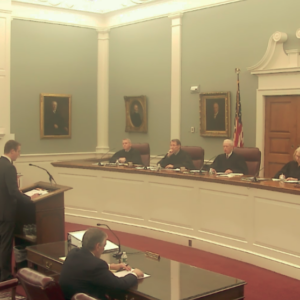Million Air’s controversial plan to set up shop at Pease International Tradeport could now hinge on tenants’ rights.
The New Hampshire Supreme Court heard arguments this week from lawyers for Port City Air and Million Air over whether or not a tenant has the right to appeal a state permit.
“What Port City Air is asking you to do today is something this court has never done,” said Nathan Fennessy, Million Air’s attorney.
But Jake Marvelley, a lawyer for Port City, said it’s basic common sense that a tenant has legal standing when it comes to the right to protect their property.
“We should have the legal right to standing,” Marvelley said.
Million Air, based in Texas, wants to build a new fixed-based operator (FBO) facility, or FBO, at Pease to service private aircraft, raising objections from residents and nearby communities concerned about the potential negative environmental impacts.
FBOs provide hangar space, maintenance and repair services, fuel, and other necessities for private planes and pilots.
The proposed site is close to sensitive wetlands that feed the water supply for Pease and the town of Newington and is already the site of a major PFAS contamination that has impacted drinking water in the Seacoast region.
Danna Truslow, a hydrogeologist Port City hired to look at the site, found levels of PFAS in the site Million Air wants to use are already ten times higher than the levels considered safe. Million Air will be building near the wetlands close to the aquifer that supplies water for several communities.
Port City filed an appeal when Million Air was granted a permit to work in the wetlands by the New Hampshire Department of Environmental Services Wetlands Bureau. However, the Port City appeal was rejected by the Wetlands Council without a hearing because they are tenants and not property owners.
“As Port City does not qualify as a landowner, it cannot qualify as an abutting landowner and therefore cannot be a ‘person aggrieved’ with standing,” wrote Zachary Towle, the DES hearing officer who issued the denial.
The law Towle cites in the denial, RSA § 482-A:10, does not define the terms for landowner, and Marvelley told the Supreme Court justices during this week’s hearing it ought to be interpreted in order to allow tenants to pursue their rights, not just landowners.
Port City has a 30-year agreement for its FBO at Pease and is one of many tenants in the Tradeport.
Fennessey said Port City has legal rights under the law if there is contamination after Million Air moves in, but not before. The right to stop the project and to appeal state permits belongs to landowners under the law, he said.
“What Port City is asking upends the administrative scheme enacted by the legislature. It would be appropriate, based on the plain and ordinary meaning of the language and your precedents, to uphold the Wetlands Council denial,” Hennessy.
Million Air still needs formal permission from Pease, the actual property owner. The Pease Development Authority is still considering the project and has yet to schedule a vote on its final approval.
The Federal Aviation Administration notified the PDA last year it is reviewing Million Air’s plan and the potential impacts it will have on the airport’s layout. As part of the FAA process, Pease is required to have a new environmental impact study done to FAA standards.
This fall, PDA Chair Steve Duprey started floating the idea that Pease itself could get into the game and start its own FBO business.
“Obviously, it’s one of those things that you have to consider very carefully, but it just seems to make common sense,” Duprey told New Hampshire Business Review. “It would give us a greater degree of assurance that we had a range of options for people who use FBOs.”



